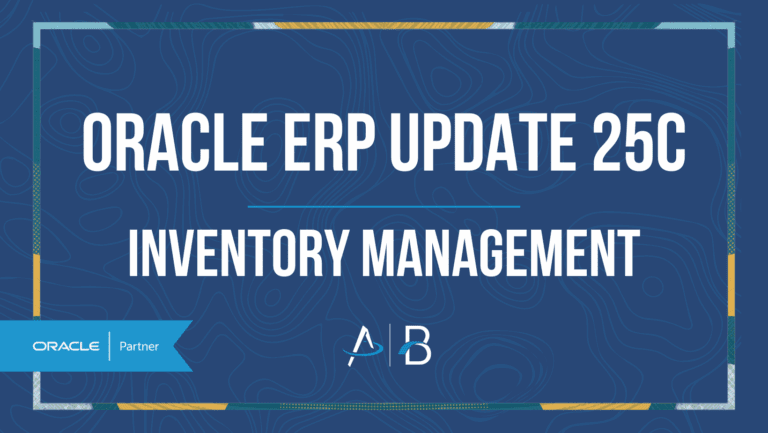5 Best Practices for a Successful Oracle Cloud Application Deployment

Oracle’s cloud application suite brings consistent processes and a single source of truth across the most important business functions—from enterprise resource planning, supply chain management, and human capital management to advertising and customer experience. The applications help you improve your customer engagements, increase your business’s agility, and react to change faster than ever before.
But success with Oracle Cloud depends on applying best practices to ensure that it will deliver on its full potential for business improvement.
Our years of experience implementing Oracle for a variety of companies have given us the expertise and opportunity to identify five best practices for successful Oracle deployments.
Best Practices for Success in Oracle Cloud
- Follow well-established System Implementation processes
- Create Oracle integrations to empower growth
- Make frequent, iterative deployments
- Continuously monitor workload KPIs
- Develop a continuous improvement process
Follow well-established system implementation processes
To ensure a successful Oracle Cloud deployment, you need to do the hard work on the front end of requirements definition, design validation, testing, and user involvement.
Regardless of whether software is physically deployed in your business through an on-premise solution or in the cloud, a well-executed implementation always requires a systematic approach to integration with your existing business workflow.
Taking the time to conduct the proper planning and designing will give you security in knowing your Oracle implementation will go seamlessly.
Create Oracle integrations to empower growth
Oracle Cloud offers a broad array of application and data integration opportunities that can simplify and accelerate cloud migration while streamlining an organization’s hybrid and multicloud operations.
Oracle integrations can pose benefits including:
- Higher availability and scalability
- Improved automation
- Higher performance
- Improved data visibility and accessibility
- Improved data accuracy
When your organization leverages Oracle’s ability to connect with other business systems and applications, you can realize these powerful benefits while automating and streamlining your processes.
This ultimately improves your organization’s efficiency and drives growth and success.
Make frequent, iterative deployments
Oracle Cloud lends itself to implementation in phases. Your organization can minimize risk by using an iterative process when testing, validating, and deploying code.
Choosing to implement smaller, more frequent changes can ensure your organization’s success and safety by reducing exposure to failures and delays in identifying and addressing issues.
You can also maximize success in your Oracle Cloud application deployment by leveraging automation to test for bugs, functionality, performance, security vulnerabilities, and integrations, thereby minimizing issues that users discover.
Continuously monitor workload KPIs
To track, measure, and optimize your organization’s success in Oracle Cloud, you should identify key performance indicators (KPIs) for your workloads. This allows you to monitor and measure your application workload health and performance and successfully identify and address issues.
Examples of ways to monitor workload performance are:
- Implement health checks to identify any degradation of application health and performance
- Maintain a centralized logging system to store and analyze application, system, and audit logs
- Create an early warning system that alerts operations when a threshold value of application health KPIs is reached
- Review long-running workflows to catch any issues early on
- Establish scaling policies based on KPIs that will ensure consistent performance for your users even during periods of high demand
Develop a continuous improvement process
We encourage our clients to do a semi-annual evaluation of the functionality of their systems, develop a list of priorities for improving processes, and implement the list items over time.
This method enables your organization to continually prioritize improvement, focus on critical needs first, and take advantage of new capabilities and opportunities in your Oracle Cloud environment.
Our ArcLight team members also offer deep expertise in identifying and implementing improvements to organizations’ Oracle environments, methodically managing items on the prioritization list to ensure maximum benefits while spreading the cost of improvements over time.
Final Thoughts on Oracle Implementation & Deployment
Oracle Cloud is a valuable application platform, but it’s vital to carefully and thoroughly plan and configure to ensure success.
Follow these best practices, and you’ll be able to fully realize the benefits of Oracle Cloud, increasing your data accuracy and accessibility while streamlining your operations and bridging the gaps between your organization’s departments.
Need Oracle Implementation or Optimization Support?
ArcLight offers experienced guidance through every part of your finance and HR transformation that facilitates business growth. From strategy and design to integration, we are your trusted partner for helping drive innovation in the cloud.
We do not simply achieve business improvement results for our clients; we do it better, smarter, and in less time than the competition.
Contact us today or learn more about our Oracle Cloud services at the link below.




